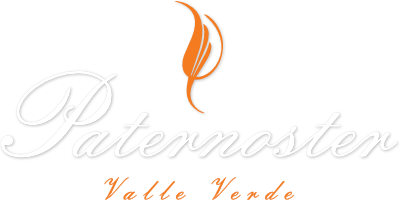
OUR APPROACH
Est. 1985
Paternoster is the founding commercial winery in the Cardinia Ranges with vines planted on this scenic and steep site, 300m above sea level, over the years 1984 to 1985.
The vineyard sits amongst the genuinely cool, rolling hills of Emerald, on the lower south-east side of the Blue Dandenongs.
Why Emerald?
The answer was simple - climate. The site was carefully chosen because of its deep, free draining, chocolate-red soils, mild summers and lingering, humid autumns; ideal conditions for Pinot Noir and Chardonnay. Grown under such conditions, the wines possess a long, silky texture and complex, sweet perfumed fruit.
Completely Natural, Hand Tended Vineyard:
The vineyard is non-irrigated and totally free of insecticides and fertilizers. Densely planted vines (2000/acre) receive only hand attention (pruning, canopy control, harvesting) with an absolutely strict adherence to cropping levels of 1-1.5 tonnes/acre.
The size was limited to 5 acres, to ensure a focus on small quantities of exclusive, premium quality wines.
Our wine making approach and philosophy:
What makes an artistic creation? What is required to make the extraordinary stand clear of the ordinary? Simply three components: materials, technique and artistry.
Materials: The true potential of wine is of course in the grape.
Technique: There is a science of winemaking as there is a science of photography.
Artistry: The judgements of balance, form and proportion are required in winemaking as they are in other forms of artistic creation.
At Paternoster, a well monitored but non-meddling approach to the fermentation and ageing process, ensures the crafting of wines which display:
Length and Depth of Flavour
Texture
Personality
Great Ageing Potential
Our Pinot and Chardonnay crushing is slow and gentle, our Pinot pigéage, soft and manual, with no pumping over. Both Pinot and Chardonnay pressings are slow and restrained, with chardonnay juice going straight to temperature controlled, cool, barrel-fermentation.
Finally, there is an extended ageing in French barrels and minimal racking. All wines receive oak maturation.
The wines are bottled without fining with only the Chardonnay receiving a delicate, polishing filter.
Taste Profiles of Paternoster:
With over 3 decades of winemaking experience, the hallmark, standout qualities for Paternoster wines are:
Purity of site
Purity of fruit
Excellent oak balance
Clean, long flavoured, powerful and succulent texture.
Our Pinots display the flavour descriptors of ripe plum, dark cherry, violets with soft, integrated oak.
Our Chardonnays, of fresh, light tropical fruit, hints of minerality, developing to honeyed, nutty, integrated oak.
The vineyard site ensures an excellent balance of natural acids, the backbone of wine, essential for longevity.
Maturation beyond 15 years can be expected.
There are three wines in the Paternoster Classification, each bringing the signatures of the vineyard from which they grew:
Premium: Classically Full Flavoured
Jack of Hearts: Reserve, Intense with Satin Texture
Heaven’s Door: Prestigious, Concentrated, Powerful
Mercaptans and Sulfides:
“Mercaptans are a toxin, Not a flavour profile”
Mercaptans (thiols) are produced in wine by the reaction of hydrogen sulfide, H2S , (sewer-gas, spoiled vegetables, or rotten eggs) with other wine components such as ethanol. Mercaptans have a very low sensory threshold, and cause aromas of struck-match, onion, burnt rubber, and septic, skunk type odours.
Wines displaying such “aromas” used to be considered a wine-making fault, and where the best way to prevent excessive H2S formation, was appropriate fermentation management.
However, there is a current trend to produce wines that excessively and deliberately display such aromas….
This begs the question…..Why?
Balance. In the right context, a little reduction may be a positive in the flavour structure of a Chardonnay, but in excess, the reduction can be grossly and unpleasantly overpowering.
For further reading:
https://www.internationalwinechallenge.com/Canopy-Articles/struck-match-in-chardonnay-whats-it-all-about.html
http://www.wineanorak.com/mercaptansinwine.htm
Bottle Closures:
The overwhelming majority of Australian wine producers now adopt screw-caps, they are cheap and easy to use. They produce a completely airtight seal and thus prevent the passage of oxygen to a bottled wine.
A cork closure however, allows minute amounts of oxygen to enter the bottle, which in turn enables the wine to properly mature and develop. Unfortunately, natural cork is not perfect. If too much oxygen enters the bottles, the wine oxidises. Further, contaminants from the cork can enter the bottle and alter the purity of the wine flavour.
Paternoster Wines has always used cork and was introduced to Procork in the early 2000’s by Dr. Gregor Christie, the Australian researcher who is the inventor and joint owner of Procork.
Procork is simply a natural cork with multiple, clear, extremely thin membranes placed over both ends. They allow oxygen to pass through at a consistent rate—but block passage of contaminants that include the chemical compound TCA—which smells rather like mould from wet paper, in infected wines. Two separate, independent AWRI (Australian Wine Research Institute) trials have shown that coated corks outperform screw-caps and natural cork.
The corks are expensive but true quality comes at a cost and since 2005, all Paternoster Wines are closed using Procork.
Further Reading:
https://www.procorktech.com/technical-science
WineWisdom: Sally Easton MW
http://www.winewisdom.com/articles/closures/cork-stoppers-with-extra-membrane/
Cork & Wine Blog | T & C Margo
http://www.tcmargo.com/Blog/procork-the-unique-absolute-shield-against-cork-taint-and-undesirable-smells-from-any-source
American Oak
At Paternoster we use only French oak for its soft and subtle influences:
"American oak adds an initial sweet flavour but then always finishes with a hard, bitter and aggressive finish - dreadful stuff! American oak is not allowed past the front gate."

